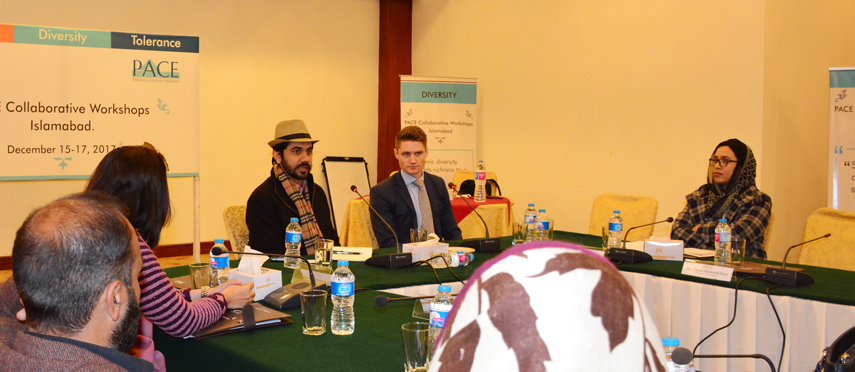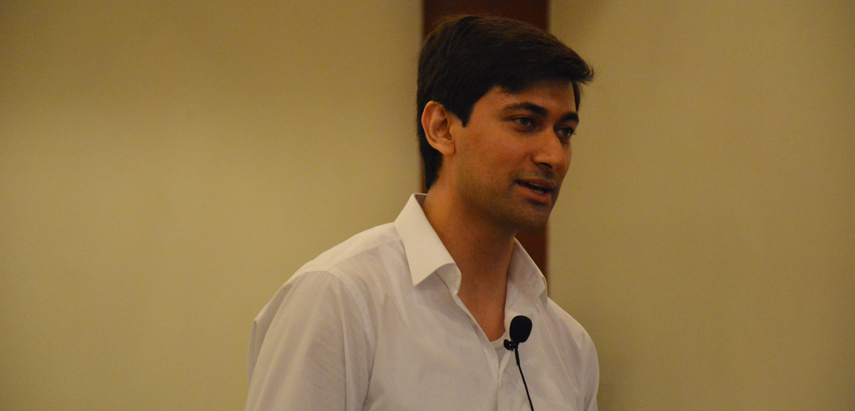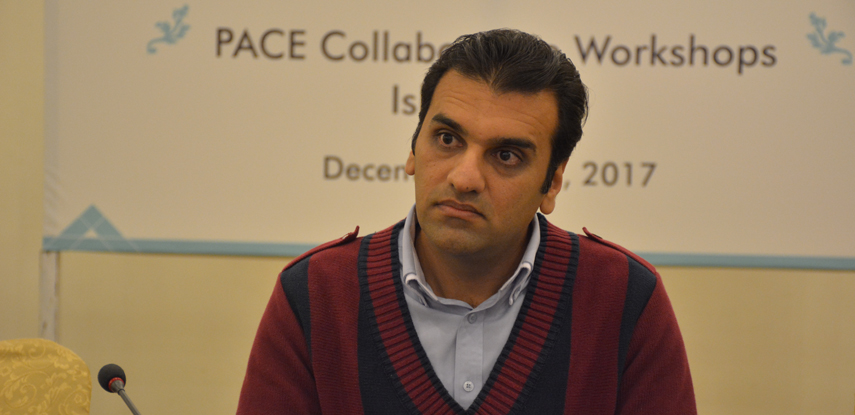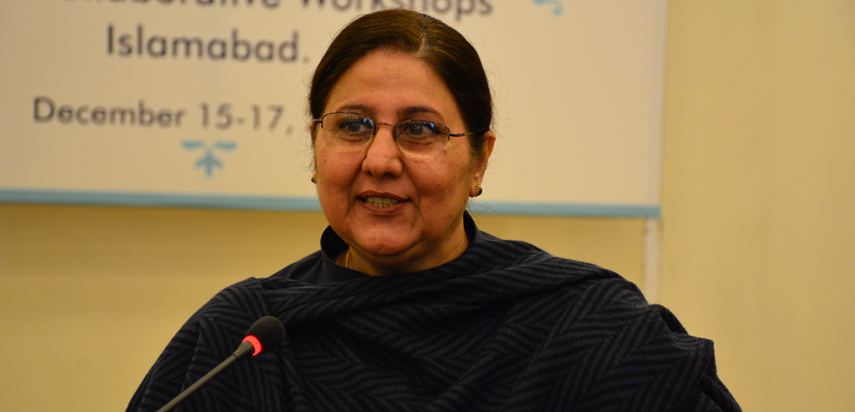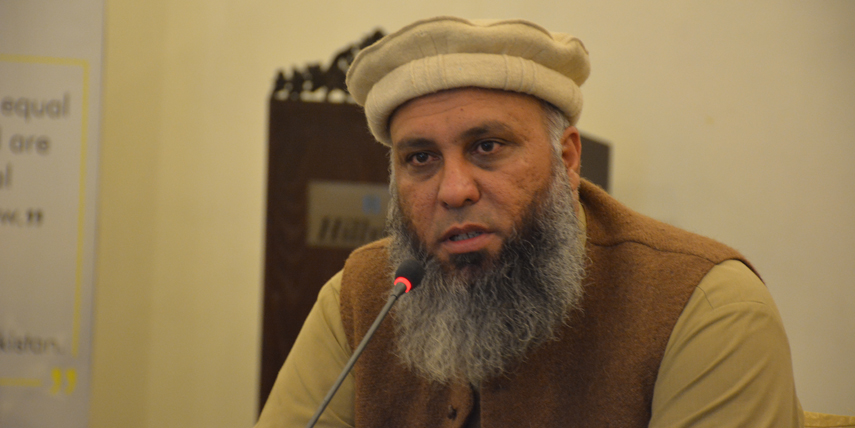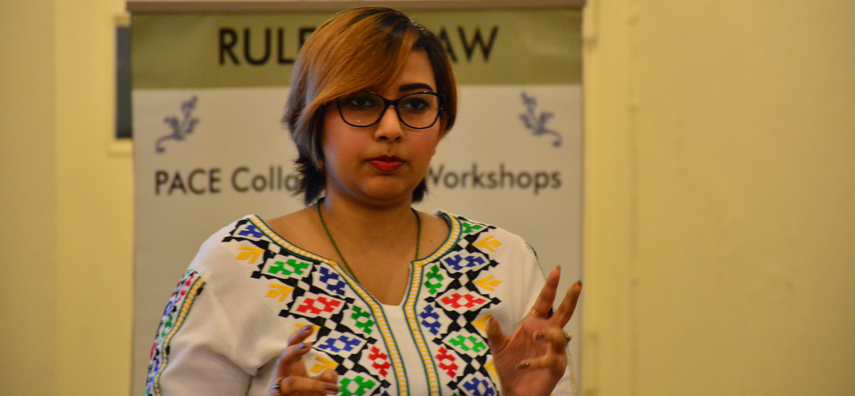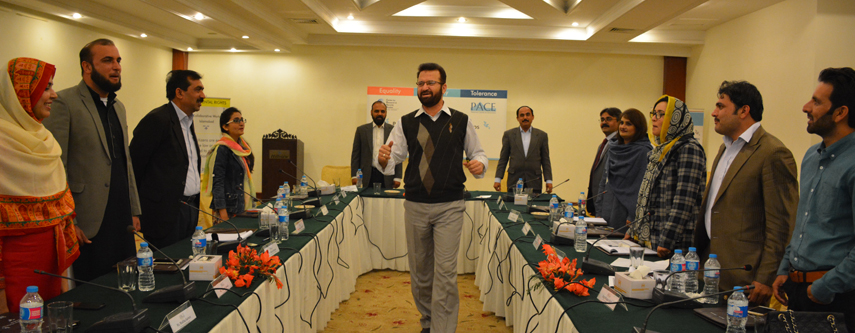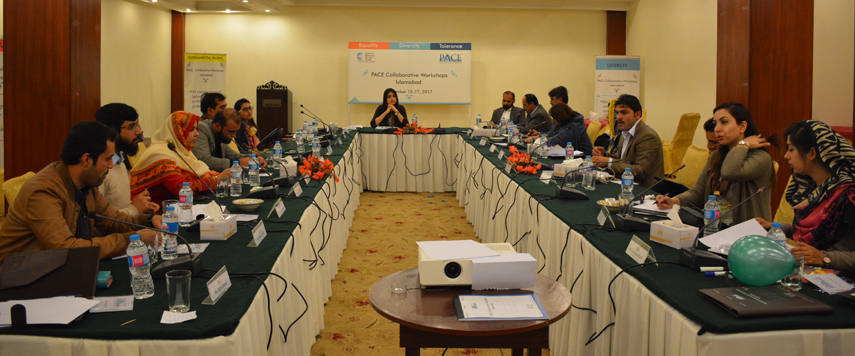The Center for Research and Security Studies (CRSS) conducted the 24th three-day PACE Collaborative workshop for young university lecturers and professors from December 15 – 17, 2017, at Hill View Hotel, Islamabad. The workshop was conducted under the umbrella of the Pakistan Center of Excellence (PACE), a counter-radicalization, pluralistic values focused project, in collaboration with the Dutch Government. Participants included young university lecturers and professors from all across Pakistan including Sindh, Balochistan, Punjab, KP, AJK, FATA and GB.
OPENING
Chief Guest: Mr. Hugh Lawson
He said, “The market place for ideas allows societies to determine which ideas are good and what ideas are bad. As an Australian, I can proudly say that our society is one of the best in the world. We have got some of the best economic indicators. Our human indicators of well-being and happiness are significantly high. This in result, has given the freest media in the world, we have got a strong parliamentary democracy and a very strict adherence to the rule of law. One of our strongest values is based on egalitarianism, regardless of your status or job, everyone is treated equally under the law. We can only have the market place for ideas, if we have some strong pillars underneath that. These include freedom of speech, freedom of religion, freedom of discrimination and equality of citizens. Those aren’t only tangible ideas written on paper but strong principles that millions of Australians and Australian government implements.”
He continued, “In Pakistan, all those freedoms I mentioned are enshrined in Pakistan’s constitution as well and are the key principles that need to be adhered to. The founding fathers of this nation all recognized it for Pakistan to be a successful nation. The narratives and messages that people want you to believe and talk about every day, it is always good to question the motives behind everything and critically analyze things around you. Only through the prism of critical analysis, you can decide what a good idea is and what a bad idea is. PACE is a great initiative and will hopefully give you the tools and the experience to be able to implement all the ideas in your day to day life and become the future leaders of this country and take the message forward in educating your students.”
Mustafa Malick: Motivation and Role of the Teachers as Gate Keepers
Mr. Mustafa Malik also spoke of motivation and compared the close relation between rights and responsibilities to motivation and demotivation, as they cannot be separated. He insisted that failure only means you are closer to success as long as you learn from it and stay motivated. “The only thing stopping you from achieving something is yourself,” he concluded.
Mr. Ammad Khalique: Media & Ethics
Mr. Ammad Khalique kicked off his session on “Media & Ethics”. He started with the definition of “Media” and “Ethics”, media is the collective communication outlet or tool that is used to store and deliver information or data. Specialized mass media channels include print media, social/digital media, photography, advertising, cinema, and broadcasting (Radio, TV). Speaking on the freedom of expression, he referred to Article 19 of the UN Charter, “Everyone has the right to freedom of opinion and expression; this right includes freedom to hold opinions without interference and to seek, receive and impart information and ideas through any media and regardless of frontiers.”
He defined ethics as the way people behave based on their beliefs about what is right and wrong and how it influences their behaviors and values. He shared his views on ethics in journalism with following points:
- Seek truth and report it
- Minimize harm
- Act independently
- Maintain standards of decency
- Be accountable
He also said that being neutral and presenting authentic news is one of the values that should be kept in mind while reporting certain issues. Media is bound in some cases and cannot be open and expose the facts. He said that words are sometimes misinterpreted and other times twisted when reporting sensitive issues; therefore, extreme care should be taken while debating on such issues. He stressed that the reporters while broadcasting should use decent language.He shared few laws and ethics that are binding upon media:
- Cyber Stalking
- Cyber Bullying
- Cyber Masking
- Cyber Frauds
- Hate Speech
- Defamation
- Intrusion to Privacy
- Harassment
- Cyber Crime Bill 2016
- Cyber Wing (FIA)
Ms. Naila Mir: Effective Student Handling
Ms. Naila Mir kicked off her session on the topic of “Effective Student Handling”. She started her session on discussing the myths and realities regarding teaching methodologies in the context of Pakistan. She shared, “You don’t need any inborn talent to become great at something. Talent can be developed and for that you need the motivation and practice. Learning through a different method may reduce effort and time and make students understand the message. A teacher should give feedback and help students identify own areas and adopt for a positive approach to overcome the weaknesses. You can help them speed up their learning tenfold by helping them identify and use the right methods.”
Dr. Azhar Qazi: Respect for Diversity, Rights and Opinions
Dr. Azhar Qazi kicked off his session on the topic of respect for diversity, rights and opinions. He said, “Teachers are brain of a society and I believe that teachers have the ability to bring the positivism in society. We are here to learn how to digest the concepts of diversity. We most of the time use the term respect to seek attention. We have to know the real meaning of this word to start implementing in our lives. Appearance of a person should never define his orientation. I look like a religious person but actually I’m not. I was serving in Pakistan Navy as an officer but later I joined the Afghanistan war. I was in Bagram in 2001 when America first attacked on October 8th. I never wanted to save the people who don’t opt for veil, who listen to the music, who don’t offer prayers regularly and who don’t follow the teachings of Islam. I didn’t belong to any conservative background. I believed the one who is not abiding by the teachings of Islam should be beheaded. I used to thin that non-Muslims have no right to live on earth. The war period ended: I came back after experiencing the bitter realities of life. Our teaching material never tells us about the difference of opinion our ascendants have had. I, as a mujahid, observed that the commanders are being served with the most lavish food instead of the food which was given to an ordinary mujahid. VIP protocol was given to the senior commanders. It was contrary to the message that was given to us for the establishment of an Islamic state. I came back and analyzed what’s wrong with my mentality. I started realizing that this is all hypocrisy and people are playing dual games in the name of “Jihad”. I started analyzing the things which I didn’t find in accordance with Islam and which forced me to join the militants. My research and study brought change in my mind set and I decided to quit the so called Jihad. What I have learned from all this is that we don’t have any right to take anyone’s life on the basis of our false perceptions. Everybody has conscience to think and adopt their lives according and we have no right to interfere.”
Public Speaking, Ms. Sateah Anoushey Afreedi
Ms. Sateah Afreedi interacted with the participants on public speaking and how can they arrange debates and discussions in their classrooms. She started with the definition of public speaking, “Public speaking is an art where you’re able to stand in front an audience and deliver a speech, or to present your point of view in a manner that people stop and listen to you. It is often confused with just ‘talking in front of a crowd’, however, oratory skills are something which not everyone has but may gain by working hard so that their natural speaking power can be improved and worked upon to turn one into an orator.” She shared about different types of conferences; a declamation contest, Lincoln Douglas Styled Debate, and Model United Nations (MUN).
She explained, “MUN is an extra-curricular activity for students from school level to universities in which role-play as delegates to the United Nations from various countries and simulate UN committees. These conferences usually take place at schools, colleges or universities through debate societies or clubs which comprise of students of an institute. Teachers, lecturers and professors are also involved as mentors, patrons and faculty advisers. At the end of the conference, outstanding participants in each committee or in the whole tournament are recognized and given an award, along with a certificate. Thousands of middle schools, high schools, and colleges around the world participate in Model United Nations, declamations and Lincoln Douglas styled debates, as it helps in polishing substantial researching skills, learning to public speak, debate, along with which, they also acquire writing skills, as well as critical thinking, teamwork, and leadership abilities.”
Ms. Afreedi shared that the first phase of organizing a successful debate competition is initial planning, “During this phase, you will decide as to what debate level you are looking to keep, and then decide if you’d like to invite middle school, high school or university-level participants to your conference. It is also important to evaluate if there’s a variety of competitions in the vicinity or not; this would help you understand if there is enough interest to hold a successful conference or not. The next step is to find a venue for your conference. Holding the conference at your own institute, whether it is a high school or a university, is a good way to keep your costs down. Keep in mind that you may only need the auditorium or hall for a declamation or a Lincoln Douglas debate, but you will need enough space for all of the committee sessions and opening and closing ceremonies as well as areas for delegates to type resolutions and have their meals if you’re deciding upon an MUN. Begin with holding a one-day event such as a declamation. Experienced Model UN conference planners can help you establish credibility for your conference and can offer wisdom they have gained through their own experiences as well as collaborate and endorse a conference.”
Mr. Safiullah Gul: Motivation and Leadership
Mr. Safiullah Gul was the last speaker of the workshop and spoke on the topic of ‘Leadership and Motivation’. He began with the saying that “he who fails to plan actually plans to fail” and shared stories of people who alone have changed the course of history, with motivation and persistence, despite all the opposition.
He said that successful leadership determines the extent of efforts directed towards a certain goal. He presented his model of goal-seeking i.e. activation, persistence and intensity. “Being alone doesn’t actually matter if you have goals and objectives set in your mind. To achieve these goals, you actually need to overcome your fears and insecurities. An individual sometimes can set an example and be motivation for others,” he shared.
The session, filled with activities to enhance creative and critical thinking, focused on looking at things from a slightly different perspective to encourage problem-solving.
CLOSING
Ms. Zehra Zaidi, Project Coordinator, PACE, in her concluding remarks, insisted that there is a dire need to revisit the widespread preconceived notions that have been passed through cultural values in the society over generations. Teachers, with the responsibility of imparting values to the young generation in educational institutions, are the most valuable engines that can challenge common negative narratives that promote hatred and bigotry. She said that teachers have the ability to shape an entire generation’s mindset to propagate tolerance, diversity and equality.
She shared that participants need to conduct these activities with their students to inculcate adherence to the rule of law and equal citizenry. CRSS provides financial and logistic support in this regard to lecturers and professors so that they can foster the universal ideals of tolerance and diversity in the young generations.

